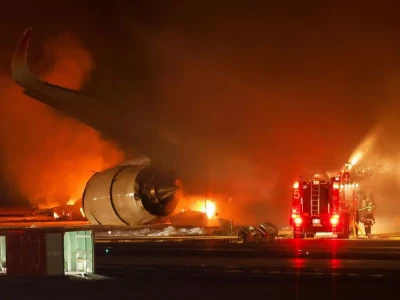
Some Boeing jets to remain grounded as investigators search for part that blew off plane
Investigators are expected to examine whether any installation flaws occurred at Spirit or Boeing plants,
Jan 7 (Reuters) - U.S. regulators on Sunday said certain Boeing-made jets would remain grounded until deemed safe to fly again, as authorities conduct a search near Portland, Oregon for a missing panel that blew off a new Boeing 737 MAX 9 jet during a flight on Friday.
The U.S. Federal Aviation Administration (FAA) on Saturday grounded 171 Boeing jets installed with the same panel after the emergency landing of the plane that had been in service for just eight weeks. "They will remain grounded until the FAA is satisfied that they are safe," the agency said in a statement on Sunday.
The so-called door plug tore off the left side of an Alaska Airlines jet following takeoff from Portland en route to Ontario, California, forcing pilots to turn back and land safely with all 171 passengers and six crew on board, with only a few minor injuries reported.
The panel, put in place on some planes in lieu of an additional emergency exit, is likely to have landed somewhere in the western suburbs of Portland, but has not yet been found. Authorities have asked the public for help finding the panel.
The accident has put Boeing back under scrutiny as it awaits certification of its smaller MAX 7 as well as the larger MAX 10, which is needed to compete with a hot-selling Airbus model.
The vast majority of the MAX 9 jet model used in the United States are operated by United Airlines and Alaska Airlines, while Turkish Airlines, Panama's Copa Airlines and Aeromexico also grounded jets for inspections.
Airlines must inspect the panel and carry out any necessary repairs. Before U.S. airlines can start flying the planes, the FAA must additionally agree to detailed inspection criteria proposed by Boeing. It was unclear if it would do so on Sunday.
Alaska Airlines halted the use of 18 MAX 9 planes on Saturday that it had resumed using following earlier maintenance checks on the FAA's order.
On Sunday, it canceled 163 flights, or 21%, and said travel disruptions from the grounding are expected to last through at least mid-week. United canceled 230 flights on Sunday, or 8% of scheduled departures.
"I imagine this was a pretty terrifying event. We don't often talk about psychological injuries but I am sure that occurred here," National Transportation Safety Board (NTSB) Chair Jennifer Homendy told reporters on Saturday, adding that it was too early to say what caused the event.
'VERY FORTUNATE'
The accident is the second to focus attention on the survivability of cabins coming within days of a collision at Tokyo's Haneda airport involving an Airbus A350 and a Japanese Coast Guard plane. No airline passengers were killed in either accident, though crew on the Coast Guard turboprop died.
In the Alaska Airlines emergency, NTSB Chair Homendy said the two seats next to the portion of fuselage that blew out were unoccupied. The independent U.S. agency has opened an investigation.
"We are very, very fortunate here that this didn't end up in something more tragic," Homendy said. Parts of the seat next to the fuselage, including the head rest, were missing.
Portland police and fire departments did not respond to requests for comment on Sunday.
The extra exit door is typically installed by low-cost airlines using more seats that require additional evacuation routes. However, those doors are plugged on jets with fewer seats. To passengers, the area looks like a normal window seat.
The fuselage for Boeing 737s is made by Kansas-based Spirit AeroSystems, which separated from Boeing in 2005. Spirit manufactured and installed the plug that suffered the blowout, a source told Reuters on Saturday.
Sources familiar with the installation process said Boeing also has a potentially key role, since it typically removes the semi-fitted left-side door panel to feed in cabin equipment and speed up production before completing final installation.
Investigators are expected to examine whether any installation flaws occurred at Spirit or Boeing plants, sources said.
Spirit referred questions to Boeing, which did not respond to a request for comment on whether it had been involved in the final installation.
Boeing and Spirit have suffered various production issues as the aerospace industry struggles to get back to normal following the COVID-19 pandemic. On Dec. 28, Boeing urged airlines to inspect all 737 MAX jets for a possible loose bolt in the rudder control system.
MAX planes were grounded worldwide for 20 months after crashes in Ethiopia and Indonesia, linked to poorly designed cockpit software, killed nearly 350 people about five years ago.
It is also ramping up production to compete with Airbus, which sources say will on Jan. 11 confirm its status as the world's largest planemaker with 735 deliveries last year.




